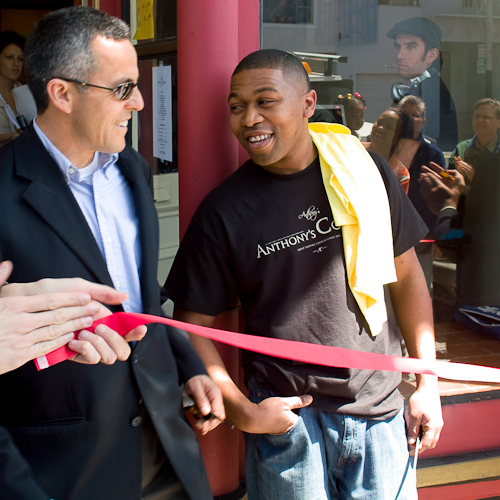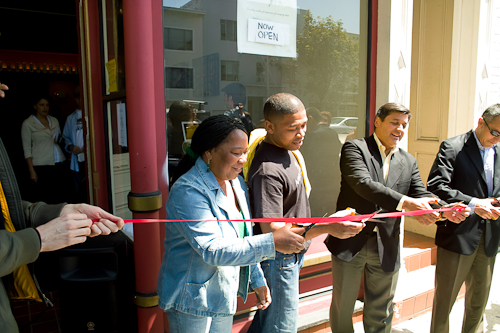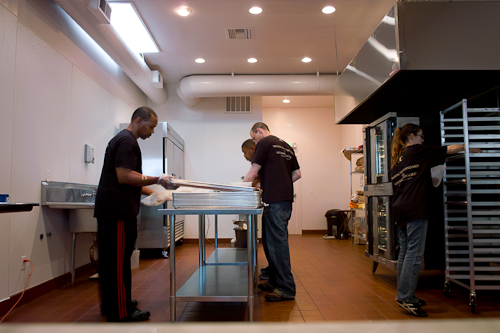Mission to Marzipan
Is a new Ben & Jerry flavor I heartily endorse.
Is a new Ben & Jerry flavor I heartily endorse.

Another gourmet treats shop joined the burgeoning scene in the Mission. Anthony’s Cookies opened today to a line that stretched around the corner.

As one of the officials present said, it takes courage to start a business in this economic climate. Specially in as business-hostile a city as San Francisco, if I may add.

Inside the store was a buzzing hive of activity, with the eponymous proprietor busy preparing batches of free cookies for the awaiting hordes. At $5 for a half dozen, these cookies are a steal. I tried the double chocolate chip, it came fresh from the oven and had a strong chocolate aroma and the right texture. All in all, a great addition to a neighborhood that already has more than its share of good places to indulge a sweet tooth. I added him to my Google map of recommended bakeries, ice cream parlors and sweet shops in San Francisco.
After eight years of a automobile-free life in San Francisco, I bought a car in December 2007. Acxiom had relocated us from our lovely downtown San Francisco office (a 15 minute walk from home) to the outer boondocks of Foster City (viable transit options: none). Before I started commuting, I simply could not fathom the point of podcasts. Now, I understand where they can be useful, but they are still not my cup of tea.
The main reason why is that podcasts are like the remaindered bin at a bookstore (remember them?). Sure, it is fun to rummage through them in search of a bargain, but usually you don’t find the books you really want there, and if you value your time as you should, it is not a productive investment thereof. Audiovisual media like podcasts force you to take them in at their speed, unlike the written word that can be scanned efficiently for triage. The so-called rich media are actually low in information value, “rich” should really be construed as in “rich foods”, i.e. pejoratively.
Audible, the downloadable audiobook company, has a promotion where they are giving away a free copy of Stephen Covey’s The 7 Habits of Highly Effective People. I was thinking of salvaging the daily 60 to 90 minutes of my life I lose to commuting by listening to books that I actually want, perhaps even learn a new language, and Dr. Covey’s often frighteningly earnest self-help book seemed to fit the bill for a test run. I soon found my attention would wander back to the road and I found it impossible to concentrate on the book, a good thing, I guess.
Back to classical music it is…
I am currently in New Orleans for a friend’s wedding, and staying at the InterContinental. The hotel has wired Internet access, but like all expensive hotels, wants to charge an extortionate fee ($7/hour) for it. This is annoying as the same hotel chains’ budget-priced hotels usually offer it as a complimentary service.
I noticed my email was going through, however. On further inspection, it turns out they only intercept port 80 HTTP traffic, but not on other ports. Security through (very thin) obscurity, in other words.
I tried using Firefox from my home machine over X and SSH port forwarding, but it was painfully slow.
At this point, I was considering setting up a HTTP proxy on my home machine and using it over SSH port forwarding, but I remembered reading something about SSH and SOCKS. I had never used a SOCKS proxy before, but it turns out this is incredibly easy: just add the -D option to ssh with a local port number, e.g. 9999, and set up your browser to use localhost:9999 as the SOCKS proxy. It worked flawlessly with my Mac OS X SSH client and Solaris 10 stock server.
This has applications beyond routing around hotel paywalls. Many public WiFi access points are unsecured. Even if they are legit (many are peer-to-peer vs. infrastructure, and presumably used by thieves to harvest passwords), they can be snooped for passwords trivially easily. Using SSH and SOCKS provides you with security when using an untrusted Internet access point, even for non-SSL sites. My email uses IMAPS and SMTP TLS so I don’t need to reconfigure it to use SOCKS, but that would also be an important protocol to secure.
All in all, a very worthwhile addition to my toolset. I can’t believe I waited so long to try it.
Update (2009-04-12):
To its credit, New Orleans’ Louis Armstrong international airport has free WiFi throughout the terminal. Chic!
The economic crisis headlines are rife with CEOs and other executives behaving in ways contrary to the interests of shareholders. Business schools teach agency theory, an economic discipline that aims to solve the problem where an agent of principals (e.g. shareholders) needs to be given wide power to perform his job, but could abuse these powers in ways inimical to the principal’s interests, specially when accountability is difficult because the agent controls the information fed back to the principals. The standard recommendation of agency theory is to align the agent’s incentives with those of the principal by setting performance-based compensation such as stock option schemes.
In the real world, of course, the reaction of an agent given a set of incentives is not to act in the way they were designed (too much work) but rather to game the system. In the case of stock options, take large amounts of risk that mostly pays off, but in unlikely cases fails catastrophically, the opposite of insurance, in fact. In the most likely case, they deliver apparently excellent results, and pocket handsome bonuses. When the bets turn spectacularly bad, the shareholders foot the bill. The failure of agency theory is just another example of how intellectually bankrupt and disconnected from reality most B-School curricula are.
This is not a new problem. Historical rulers from Cyrus the Great to Alexander to Peter the Great to Stalin had to control power-hungry and untrustworthy satraps or barons. The way they solved the problem was invariably to set up a network of spies and run two parallel and competing chains of command constantly at each other’s throats, to keep each other honest. To a certain extent, the more arbitrary and capricious the ruler’s favor seems to be, the more effective it is at keeping the underlings in line.
Investors would be well advised to study the tried and proven methods of the great tyrants. The way to control untrustworthy agents is fear and setting up parallel information-gathering networks unbeholden to the agent, not by lavishing rewards that only motivate even worse behavior. Instead of relying on corporate governance consultancies like ISS, they should hire private eyes like Pinkerton to infiltrate their companies.